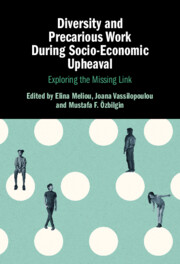Book contents
- Diversity and Precarious Work during Socio-economic Upheaval
- Diversity and Precarious Work during Socio-economic Upheaval
- Copyright page
- Contents
- Figures
- Contributors
- 1 Introduction
- 2 Pandemic Precarities and Gendered Biopolitics within the Neoliberal University
- 3 LGBTQ+ Individuals and Precarious Work
- 4 Age, Gender, and Precarity
- 5 How the (In)Ability of Using One’s Disability Strategically Reinforces Inequality and Precariousness amongst Disabled Workers
- 6 Classed and Gendered Experiences of Precarity in Dirty Work
- 7 Precarity and Diversity
- 8 Precarious Work in the Gig Economy
- 9 Refugees’ Vulnerability towards Precarious Work
- 10 Trapped in Precarious Work
- 11 How Precarity Is Threaded into Migration Rules
- 12 Culture, Precarity, and Dignity
- 13 Transforming Humanitarianism
- 14 Artificial Intelligence, the Gig Economy, and Precarity
- Index
- References
1 - Introduction
Published online by Cambridge University Press: 01 February 2024
- Diversity and Precarious Work during Socio-economic Upheaval
- Diversity and Precarious Work during Socio-economic Upheaval
- Copyright page
- Contents
- Figures
- Contributors
- 1 Introduction
- 2 Pandemic Precarities and Gendered Biopolitics within the Neoliberal University
- 3 LGBTQ+ Individuals and Precarious Work
- 4 Age, Gender, and Precarity
- 5 How the (In)Ability of Using One’s Disability Strategically Reinforces Inequality and Precariousness amongst Disabled Workers
- 6 Classed and Gendered Experiences of Precarity in Dirty Work
- 7 Precarity and Diversity
- 8 Precarious Work in the Gig Economy
- 9 Refugees’ Vulnerability towards Precarious Work
- 10 Trapped in Precarious Work
- 11 How Precarity Is Threaded into Migration Rules
- 12 Culture, Precarity, and Dignity
- 13 Transforming Humanitarianism
- 14 Artificial Intelligence, the Gig Economy, and Precarity
- Index
- References
Summary
Existing research on the rise of precarious forms of employment has paid little attention to gender and diversity challenges. Yet precarious work has damaging effects for vulnerable demographics, with women, ethnic minorities, and people with disabilities more considerably affected. This volume unpacks this research and offers insights into the role of organisations in fostering inclusive change.
Keywords
- Type
- Chapter
- Information
- Diversity and Precarious Work During Socio-Economic UpheavalExploring the Missing Link, pp. 1 - 11Publisher: Cambridge University PressPrint publication year: 2024



